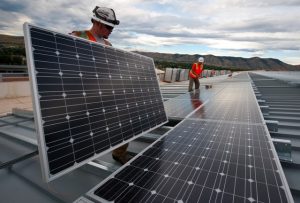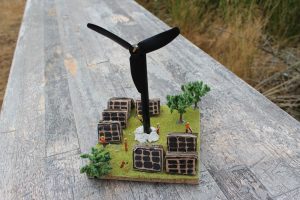Could this pioneering Climate Solutions Summer Camp be the first of many?
“It’s about moving out of the conditional tense – ‘I could, I should, I would’ – and getting into action,” explains Andrea Clément, Director of the Clement Foundation, which organises educational projects on sustainability and the environment.
Clement is passionate about the goal of last month’s “Climate Solutions Summer Camp”, held from the 10th to the 14th of August 2020 under the hashtags #HackYourCity and #WeFindSolutions. The event brought together a group of bright young minds and gave them the chance to learn, explore and develop local solutions to a huge and complex global challenge — climate change.
The Clément Foundation is the camp’s funding partner and facilitated the event throughout, in collaboration with a whole range of different educational and environmental organisations – both from the local area and much further afield.
Ecokids, an organisation based in Hofheim, Germany, which organises workshops and activities for children around the topic of sustainability, provided the camp’s beautiful location – an orchard complete with fruit trees, bushes and beehives – on the outskirts of Hofheim. Ecokids director Katrin Conzelmann-Stingl was also at the camp each day providing both pedagogical and practical support.
Alongside her was Kajo Stelter from Weltweit e. V., another German NGO based in Bad Soden that works to implement local solutions to global climate challenges, Irina Rogge from GeWissen-Schaffen, an organisation that leads educational projects on technology and sustainable development for children and teachers in both Berlin and Mexico, and I was there from 2811, a social enterprise I founded in Chile that supports international projects for positive social and environmental impact.
Another important collaborator was SolarInvest Main-Taunus e. G., a well-established solar energy cooperative that supports the production of green, decentralised energy in the region. Their solar panels produce green, renewable energy, which is a powerful tool in the fight against climate change. But how can they encourage even more local people to support the energy transition and install solar panels on their roofs? That’s the climate conundrum that the young people were asked to solve.
Setting the challenge
Katrin, Kajo, Irina and Waldo led the camp and guided the group throughout the week, from Monday’s challenge presentation, through the brainstorming and idea creation process, all the way up to the final pitch on Friday, where they were to present their ideas to an audience of not just friends and family, but also local politicians, climate change experts, and of course SolarInvest themselves.
The 14 young participants, aged from 12 to 15, all study at different schools and came from different locations – including Dietzenbach, Flörsheim, Eppstein, Frankfurt and Hofheim – but were connected by a passion for positive change.
“Everyone here has the same goal – to do something about climate change. It’s so great to find out that there are so many other kids who want to get involved in things like this,” 13-year-old Len excitedly explained.
The concept behind the Climate Solutions Summer Camp comes from the Young Innovators programme, developed by Europe’s leading climate innovation initiative Climate-KIC. The Young Innovators programme aims to empower and inform the climate leaders of tomorrow – the young people of today – through fun and creativity, with a focus on practical workshops, innovative learning methodologies, and so-called “challenge-based learning”. The week-long event in Hofheim was a pioneering experiment, the first of its kind to be held in Europe, and hopefully the first of many more to come.
Channelling passion and energy into positive impact
On the first day, the camp was visited by representatives from SolarInvest – Alex Wenzel, Günter Bouffier and Konrad Petry. Armed with a solar panel, as the sun shone down, they were able to teach the group about solar energy in a really hands-on way. Stefan Huber, project manager at Hofheimer Wohnungsbau (HWB) also paid a visit, telling them about the multi-generational house “Wir” in Klingenborn, where SolarInvest’s panels have been installed and all of the inhabitants are using green, solar electricity directly from the roof.

But while there are great initiatives out there, there are still so many roofs without solar panels in the region – meaning so much more potential for impact! How can SolarInvest get to them? What could be the solution?
Searching for solutions
Over the next five days, the young people got to work. After forming four groups, they were guided step by step from problem to possible solution. With the help of games, presentations, visual tools and even an introduction to design thinking, they went from brainstorming, to narrowing down their ideas, to finally polishing them and preparing them for an audience.
They even learned about different story-telling techniques to help them perfect their pitch on Friday afternoon.
Several of the teams even went so far as to call up local experts to check the validity of their ideas, and to reach out to other local stakeholders to see if they could win their support for their plans. But it wasn’t all hard work either, with regular breaks for bubble-blowing sessions, slackline practice and a trip to cool off in the shade next to a nearby stream.
As they began digging deeper into the problem and considering all of the people, institutions and structures involved, the complexity of the problem became clear. “There are so many different perspectives to take into account,” 15-year-old Hiwa explained. Another student added: “And there are so many problems. And those problems are usually political. It’s not that things can’t be done, it’s just that people don’t agree on things because they don’t communicate.” The camp was the perfect space to do exactly that – to enable communication between local and national NGOs, local politicians and young people with a passion for change and for a better world – and to turn that symbiosis into positive impact.
There were even more visits later in the week – Bernhard Köppler, Hofheim city councilor, Ulrich Disser, the environmental officer of the city of Hofheim, and Daniel Philipp, climate protection officer for the Main-Taunus district, all came by to talk about all of the green building initiatives and energy-friendly measures already in place in the area. Daniel Philipp was enthusiastic about the camp’s mission and its potential impact: “Everyone can make a difference, no matter what age they are. It’s important that the next generation internalises that idea very early on in life.”
Time to present and pitch
The grand finale on Friday afternoon saw all of the guests, collaborators, friends and family gathered together in the orchard to hear the ideas and to crown the winner. County Commissioner Madlen Overdick, whose department is responsible for environment and climate, was also in the audience.

The four teams presented their ideas with confidence and enthusiasm. One team planned to use direct campaigning and connections to get SolarInvest more clients – visiting a local businessman’s networking meeting to promote SolarInvest to them directly. They even had the connections that they needed to get an invitation.
A second team developed an ad campaign for the radio that will get listeners hooked with humour – after one last polish, the script was ready to be recorded. Now they just need somebody at the radio to help them with the recording.
A third team had an ambitious idea to double the impact of the solar panels by combining them with wind turbines. The team made a model of their idea the night before, which they brought with them.
The fourth team wanted to initiate a climate week at school, with a focus on climate change in the lessons, energy-saving activities and a push for solar panels on their school roofs. They were keen to get started with the plan soon as the new term began.
The variety and creativity shown by the different teams made it impossible for SolarInvest to decide on an outright winner, meaning the first place award is split four ways. Each participant also received a certificate of participation from the organisers and their own mini solar jar lamp to take home.
Günther Bouffier and Peter Schöbel of SolarInvest were deeply impressed by the “vehemence and inspiration” shown by the young people. When asked if he would be interested in taking part in a similar event in the future, Bouffier’s answer was unequivocal: “Absolutely! There are some excellent ideas here that will definitely help us get more roofs in the Main-Taunus area. This was a great experience for SolarInvest, which means it’s good for the climate too.”
They deeply believe that it’s crucial to engage young people in tackling these kinds of important challenges, the next generation who are set to experience climate change most intensely. As Schöbel himself said, addressing the children: “If not you, then who else?”
What’s next?
The next step is to support the young people to turn their well-formulated ideas into real-life solutions. That support includes an online mentoring programme with regular check-ins between the young people and the camp organisers, as well access to the organisers’ wider network for help on implementing or further fine tuning their ideas. There’s even support in the form of funding available to help their ideas become reality – be it renting a recording studio or printing out advertising materials.
Now that they’ve completed this unique summer camp, these young people automatically become the first members of a Climate Solutions Camp alumni network. That gives them the chance to connect with future camp participants, give other young people advice and maybe even collaborate with them on more climate solutions in the future.
“I hope to initiate more camps like this in the future here in Main Taunus Kreis,” says Andrea Clement, “maybe going even further and reaching the whole of Hessen.”
The Climate Solutions Summer Camp was a valuable learning process for the participants, but it was also a way to bring all kinds of different people together to collaborate on concrete ideas for a greener local area and a more sustainable world. After all, collaboration is key when it comes to finding the most effective, workable and efficient solutions. Or as 15-year-old Naila so beautifully put it: “I’ve learned that everyone can do something. And when everyone works together, the impact we make can be huge.”
To tackle the climate crisis, we all need to get involved. Many thanks to all of those who made it possible and here’s to many more summer camps, more empowerment and inspiration and more youth solutions to the challenge of climate change!
Marisa Pettit is Editorial Manager at RESET.org


